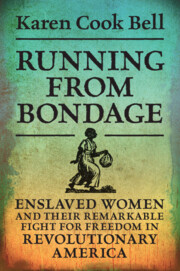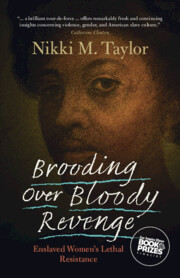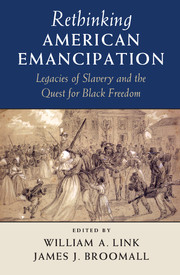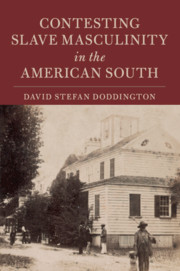Running from Bondage
Running from Bondage tells the compelling stories of enslaved women, who comprised one-third of all runaways, and the ways in which they fled or attempted to flee bondage during and after the Revolutionary War. Karen Cook Bell's enlightening and original contribution to the study of slave resistance in eighteenth-century America explores the individual and collective lives of these women and girls of diverse circumstances, while also providing details about what led them to escape. She demonstrates that there were in fact two wars being waged during the Revolutionary Era: a political revolution for independence from Great Britain and a social revolution for emancipation and equality in which Black women played an active role. Running from Bondage broadens and complicates how we study and teach this momentous event, one that emphasizes the chances taken by these 'Black founding mothers' and the important contributions they made to the cause of liberty.
- Sheds light on the untold stories of enslaved Black women who escaped bondage during the Revolutionary era
- Reconstructs fugitive women's stories through newspaper advertisements, first-person accounts in trial records, antebellum memories and interviews with former slaves
- Underscores the centrality of women's self-emancipation during the Revolution
Awards
Winner, 2022 International AAHGS Non-Fiction Book Awards, Afro-American Historical and Genealogical Society
Reviews & endorsements
'Karen Cook Bell's research brilliantly shows that the phenomenon of Black female flight in the period of slavery was not idiosyncratic but was, in fact, pervasive. This pathbreaking and beautifully written work centers the voices of Black women in slavery and abolition. A must-read.' Anne C. Bailey, Professor and Director of Graduate Studies, History Department, and Director of the Harriet Tubman Center for the Study of Freedom and Equity, Binghamton University
'In this new account of the American Revolution, Karen Cook Bell tells the story of how Black women flipped slavery's geography of containment upside down and redrew it as a treasure map to self-liberation. Her deep dives into fugitive sources bring back amazing stories of women who seized a time of war and disruption as the opportunity to carry themselves and their loved ones out of bondage. After Running from Bondage, no account of this period will be complete unless it shows how Black women's freedom-seeking brought about revolutionary changes.' Edward E. Baptist, Professor of History, Cornell University
'Fugitive lives matter! Through the lives and actions of fugitive enslaved women, Running from Bondage will compel the reader to consider the impact of the enslaved upon the American Revolutionary Era. Karen Cook Bell simultaneously restores women to the discussion of fugitivity while restoring both women and fugitivity to the larger narrative of slave resistance during the period.' Peter J. Breaux, Associate Professor of History, Southern University and A&M College
'Collectively, Running from Bondage artfully situates fugitive women in the history of the American Revolution and Black resistance … Future scholars of Black women's experience in the Revolution and beyond would be wise to consult Bell's findings and to mirror her approach.' G. Patrick O'Brien, H-Net Reviews
'Gracefully written and convincingly argued, Running from Bondage deserves the attention of anyone interested in gender, slavery, or the American Revolution.' Natalie Zacek, The Journal of Interdisciplinary History
'Bell has offered an invaluable service in bringing to the center those who have held a 'peripheral position' in the historical record.' Ryan C. McIlhenny, Journal of the Early Republic
'Cook Bell deftly pieces together engrossing stories of escape to draw out a larger, vibrant portrait of Black female resistance.' Jessica Blake, The Journal of Southern History
'… Running from Bondage artfully situates fugitive women in the history of the American Revolution and Black resistance. Bell highlights the motivations that drove enslaved women of the Revolutionary Era to flee bondage in greater numbers than they had before while also exploring the strategies these women employed and the ways this resistance influenced the post-Revolutionary generation.' G. Patrick O'Brien, H-Net
'Bell's deep dive into the stories of self-emancipated enslaved women provides an overdue examination of their lives and legacy in American history. … 'Running from Bondage' is the product of excellent research, with persuasive analysis, and provides well-written recalibration of this period of American history.' Kelley Fanto Deetz, The Journal of African American History
'Running From Bondage shines in its vivid recounting of the conditions that enslaved women faced and their efforts to free themselves and their children.' Naomi Schiller, Society for US Intellectual History
Product details
No date availablePaperback
9781108926720
258 pages
228 × 152 × 15 mm
0.4kg
Table of Contents
- Introduction: Enslaved women's fugitivity
- 1. 'A negro wench named Lucia': Enslaved women during the eighteenth century
- 2. 'A mulatto woman named Margaret': Pre-Revolutionary fugitive women
- 3. 'A well-dressed woman named Jenny': Revolutionary Black women, 1776–1781
- 4. 'A negro woman called Bett': Overcoming obstacles to freedom in Post-Revolutionary America
- 5. Confronting the power structures: Marronage and Black women's fugitivity
- Conclusion.






